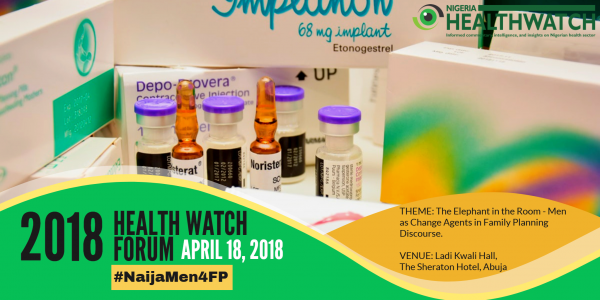From inception, family planning interventions and responsibility for the uptake of family planning commodities has pre-dominantly been targeted at women. This seems logical, as women are the end users of most family planning commodities. Yet, men are often the primary decision makers that have an influence on when (or whether) women access family planning services or commodities. So, what would happen if family planning interventions and discussions targeted men just as much as they did women? How would this affect uptake of family planning services and commodities? More importantly, how would it help Nigeria reach a modern contraceptive rate of 27% among all women by 2020, as the government has pledged?
At the just concluded 2nd THISDAY Healthcare Policy Dialogue, the Nigeria Health Watch press team spoke with Dr. Joe Abah, Country Director, DAI Global. Speaking on the role of men in family planning, he said,
“We live in a patriarchal society where all advice is targeted at women, and men take no responsibility… Men have a vital role in family planning because they have the responsibility to care about the health of their spouses… Men need to first see it as their responsibility… The fact that one party is the one bearing the physical responsibility doesn’t take away the responsibility from the other party to make sure she is in a fit state.”

The first Nigeria Health Watch Forum for 2018 is themed, “The Elephant in the Room – Men as Change Agents in the Family Planning Discourse”. The Forum, a town hall style breakfast meeting, will have four speakers address the role of men in helping Nigeria meet its FP2020 Commitments from their different perspectives.
This will be followed by two panel discussions focusing on the following critical questions:
- How do we accelerate action to meet Nigeria’s FP 2020 Commitments?
- How do we engage men to support their partners in seeking FP Services?
- How do we get men to take responsibility for FP without depending on women?
The speakers and panelists come from a wide range of health care services and specialties, from general practice to community practice. Their work spans from clinical practice, teaching, policy making to management of health services.
Dr. Diene Keita, the UNFPA Country Representative brings a wide breadth of experience having worked across many countries on family planning initiatives. Effiom Nyong Effiom, Country Director for Marie Stopes International Organization Nigeria (MSION), has over 20 years of experience in commercial and social enterprise and expertise in using private sector business models to deliver social benefits.
Dr. Ejike Oji, Chairman, Association for the Advancement of Family Planning, is an experienced doctor with a demonstrated history of working in the health wellness and fitness industry. He has experience in the areas of Non-profit Organizations, Life Coaching, Epidemiology, and Program Evaluation. Dr Adebimpe Adebiyi, Director of Family Health at the Federal Ministry of Health, is currently responsible for initiating policy formulation, monitoring and evaluation of the implementation of health policies on Reproductive, Maternal, Newborn, Child and Adolescent Health as well as Elderly care, Nutrition and Health Promotion.
The panellists are: Dr. Laz Ude Eze, Family Planning Advocate, National Champion for Health; Sa’adatu Hashim, Amira, FOMWAN Kano State Branch; Florida Uzoaru, Founder, Slide Safe; and Rev. Isaac G. Gbaero, Senior Pastor, First Baptist Church, Sabongari, Zaria, Vice-Chairman, Zaria Interfaith for Safe Motherhood/NURHI.
The Health Watch Forum will be moderated by Dr Ifeanyi Nsofor, Director of Policy and Advocacy, Nigeria Health Watch, and CEO, EpiAfric.

Our objective is simple; “To ignite change in the family planning sector by inspiring action through advocacy and innovation”. We need to ask the tough questions because it is no longer sufficient for the Nigerian government to make declarations, they need to be held to account for outcomes.
For those who have registered to attend the event, we at Nigeria Health Watch would like you to keep three things in mind as you attend: Please download your ticket, ensure that you come early, and come with your questions, ready to learn and network with others working to make the health sector better.

There will be robust conversations both during the health forum and online throughout the day. If you are unable to attend the event, you can watch the event via livestream on our Facebook Page. You can also follow the conversation on Twitter, follow the hashtag #NaijaMen4FP. If you don’t yet, follow Nigeria Health Watch on Twitter @nighealthwatch, as we will live tweet the event.
Join us on April 18th as we explore the critical role that men play in igniting change in Nigeria’s family planning arena. Come hear the voices of #NaijaMen4FP.




It is remarkable to have men talking/promoting Family planing in Nigeria.
However, may need to have also greater involvement of men from the region with lowest uptake of FP to share experiences of what work and what work
not, especially recognizing socio-cultural context and barriers in such region.